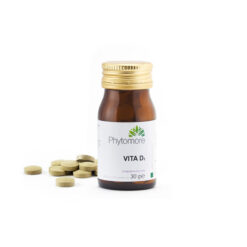Vitamina D3 2000 I.U.
€14.00
Vitamin D3 (2.000 IU) 60 tablets
Supports bone health, immune system and heart health.
Vitamina D3
Vitamin D is a fat-soluble vitamin required for intestinal absorption of minerals such as calcium, magnesium and phosphate, and for many other biological functions.
In nature, vitamin D exists in two variants
Vitamin D2 (also called ergocalciferol), taken with food or supplements
Vitamin D3 (also called cholecalciferol), synthesised in the skin following exposure to sunlight.
Both forms, in order to be biologically active, require enzymatic conversion which takes place in the liver and kidneys.
Clinical experience and scientific studies over several decades have shown that vitamin D is essential for proper mineralisation of bones and teeth during growth and for maintaining adequate bone mass and enamel integrity throughout adult life. In addition, vitamin D contributes to maintaining normal levels of calcium in the blood by fine-tuning the release and deposition of this mineral in the bones, which are its main form of storage in the body. In addition to ensuring the maintenance of bone health, vitamin D prevents calcium from being deposited in other tissues of the body, such as the kidneys, arteries or bone cartilage, where it could lead to dysfunction and severe pathologies (arteriosclerosis, tissue calcifications, etc.).
Calcium is also the key neurotransmitter that ensures proper contraction of the heart and other muscles in the body. Vitamin D’s action in regulating blood calcium levels is therefore also important in helping to maintain normal muscle function.
Moreover, recent studies have shown that vitamin D, acting as a hormone, contributes to
- improve the functionality of the immune system, which is responsible for protection against infection;
- preventing or slowing down the development of cancer, halting the growth of cells, promoting their differentiation and programmed death (apoptosis), and reducing the formation of new vessels (angiogenesis);
- stimulate the production of endorphins, serotonin and dopamine, neurotransmitters that modulate mood and counteract depression;
- stimulate the production of endorphins, serotonin and dopamine, the neurotransmitters that modulate mood and counteract depressive phenomena (low vitamin D levels are in fact closely related to depression, and often trigger the compulsive hunger attacks typical of reactive depression)
- improve the function of insulin, a hormone needed to metabolise sugar, and is therefore useful in combating type II diabetes;
- promotes the production of leptin (a hormone involved in the regulation of fat metabolism and energy consumption, which alleviates hunger pangs).
- and decreases the concentration of cytokines, responsible for the increase in adipocytes, with slimming effect);
- in men, it increases testosterone synthesis, increasing muscle tone and physical strength.
The dietary supplement Vita D3 IU 2000 is indicated for:
- viral and bacterial infections of the respiratory tract
- diseases of the osteoarticular and muscular system, rickets, osteoporosis, decalcification, osteomalacia reduced bone density, fractures, muscle spasms
- autoimmune diseases
- hypertension
- rheumatoid arthritis
- tumours
- infarction
- Alzheimer’s disease
- dermatitis, acne, skin infections
Considering that vitamin D is scarcely present in food (some fatty fish, milk and dairy products, eggs, liver and green vegetables, cod-liver oil), and that most vitamin D is largely accumulated by our bodies through exposure to the sun’s rays, and that unfortunately, most of us live indoors, vitamin D supplementation is also considered advisable on a cyclical basis, especially in special situations related to growth, pregnancy and lactation.
The following table shows the reported maximum intake values that presumably pose no danger of toxicity to healthy people. Thus, chronic exceeding of these limits significantly increases the risk of side effects from overdose; the adjective chronic is important, since occasional ingestions of even considerably higher doses do not cause acute toxicity.
| Age | Kids | Men | Women | Pregnancy | Breastfeeding |
| 0-12 months | 25 mcg (1,000 IU) | ||||
| 1-13 years | 50 mcg (2,000 IU) | ||||
| 14+years | 50 mcg (2,000 IU) |
50 mcg (2,000 IU) |
50 mcg (2,000 IU) |
50 mcg (2,000 IU) |
|
Instructions for use
1 tablet x 1 time a day during the main meal
Ingredients
Vitamin D3, microcrystalline cellulose, calcium phosphate, silicon dioxide, magnesium stearate.
Content of the characteristic ingredients per maximum daily dose of 0,5 g : 50 μg of vitamin D3 per tablet (2000 IU)

 Ελληνικα
Ελληνικα Italiano
Italiano




